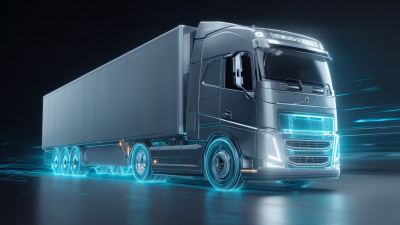Leave Your Message
In today's rapidly evolving transportation landscape, the shift towards sustainable solutions is increasingly shaping business operations, particularly with the advent of electric trucks. These innovative vehicles not only minimize environmental impact but also offer substantial operational savings for businesses looking to optimize their logistics and delivery systems.

In this ultimate guide, we will explore various types of electric trucks available in the market, assessing their unique features, performance capabilities, and suitability for different business needs. Whether you represent a small local enterprise seeking to enhance your fleet's efficiency or a larger corporation aiming for sustainability, understanding the options in electric trucks is crucial. This guide will equip you with the knowledge required to make informed decisions and seamlessly integrate electric trucks into your business strategy, propelling you toward a greener future.
When selecting electric trucks for your business, it is essential to start with a clear understanding of your specific requirements. Consider the nature of your operations: Are you transporting goods within urban areas or covering long distances? The range of the electric truck becomes crucial, as it directly affects how many deliveries you can complete before needing a recharge. Analyze your typical load capacities and the types of items you deliver. Different trucks are designed for varying weight limits and cargo sizes, so be sure to match these specifications with your operational demands.
Additionally, think about the infrastructure of your business and available resources. Assess whether your facilities can support electric vehicle charging stations and how long it would take to recharge your fleet during off-hours. Furthermore, examine the total cost of ownership, including potential savings on fuel and maintenance, versus the initial purchase price of the electric trucks. By thoroughly evaluating these factors, you can make a well-informed decision that aligns with your business objectives and sustainability goals.

When considering electric trucks for your business, understanding the key features can significantly impact your operational efficiency. First and foremost, pay attention to the truck's range. It’s essential to choose a model that aligns with your daily travel needs to avoid range anxiety. For businesses that require long-distance travel, select trucks with extended battery life or the option for fast charging stations to ensure your fleet remains productive throughout the day.
Another crucial feature is payload capacity. Make sure the electric trucks you consider can handle the weight you need to carry. Look for detailed specifications that outline both the maximum payload and the distribution of weight to ensure safety and compliance with regulations. Additionally, consider the vehicle's towing capability if your business requires it.
Lastly, assess the available technology features. Many electric trucks come equipped with advanced telematics systems that can track vehicle performance, energy consumption, and maintenance alerts. This data can be invaluable for optimizing fleet management. Investing in trucks with robust connectivity can enhance your operational insights, streamline logistics, and ultimately reduce costs. Remember to evaluate after-sales support and service options as well, which can make a significant difference in maintaining your fleet.
When considering electric trucks for your business, evaluating the total cost of ownership (TCO) is crucial. TCO encompasses not just the initial purchase price, but also the long-term expenses associated with operating and maintaining electric vehicles. One of the most significant advantages of electric trucks is their lower fuel costs; electricity is usually cheaper than diesel, which can lead to substantial savings over time. Additionally, electric trucks often have fewer moving parts compared to traditional combustion engines, resulting in lower maintenance costs and reducing the likelihood of costly repairs.
Another important factor in TCO is the availability of government incentives and rebates for electric vehicle purchases. Many regions offer tax credits, grants, or other financial incentives that can significantly reduce the upfront costs of electric trucks. Businesses should also consider the possibility of increased operational efficiency—electric trucks can often be charged during off-peak hours, which not only helps in cost management but can also promote greener practices. By thoroughly analyzing these components of TCO, businesses can make informed decisions that align with their sustainability goals while ensuring financial viability.
When choosing the right electric truck for your business, it's essential to compare the top models available on the market. Several factors can influence your decision, such as payload capacity, range, and fast-charging capabilities. One leading contender is the Ford F-150 Lightning, which boasts impressive towing capabilities and a driving range sufficient for most daily operations, making it a popular choice for companies that require versatility.

Another strong option is the Rivian R1T, designed with outdoor and off-road capabilities in mind. This truck combines sustainability with high performance, featuring a spacious interior and advanced technology integration, appealing to businesses that prioritize both efficiency and innovation.
By evaluating these models alongside others like the Tesla Cybertruck and Lordstown Endurance, you can determine which electric truck best meets your specific business needs, ensuring a worthwhile investment in the future of your fleet.
As businesses consider transitioning to electric trucks, understanding the incentives and regulations surrounding EV adoption is crucial. In many regions, including India and Thailand, various government plans aim to encourage the adoption of electric vehicles through financial incentives and infrastructural support. For instance, India is currently examining the integration of EV charging infrastructure investment into its manufacturing incentive scheme. This move could entice global automakers to invest in the EV market, ultimately providing local businesses with greater access to electric trucks.
In Thailand, the government has taken a proactive stance in supporting the electric vehicle sector, positioning itself as a leader in sustainable mobility within Southeast Asia. By fostering a conducive investment climate, they are not only attracting global players in the automotive industry but also ensuring that local businesses can benefit from the growth of electric trucks. As contractors and fleet operators explore their options in 2025, the landscape of federal and state incentives will play a pivotal role in making electric trucks a viable choice for their operations. With available financial support and a growing market, now is the time for businesses to navigate these incentives and make an informed transition to electric vehicles.
| Truck Model | Payload Capacity (lbs) | Range (miles) | Charging Time (hours) | Incentives Availability |
|---|---|---|---|---|
| Model A | 2,000 | 150 | 1.5 | State & Federal |
| Model B | 3,000 | 200 | 2.0 | Federal Only |
| Model C | 2,500 | 180 | 1.8 | State Only |
| Model D | 3,500 | 250 | 2.5 | None |






